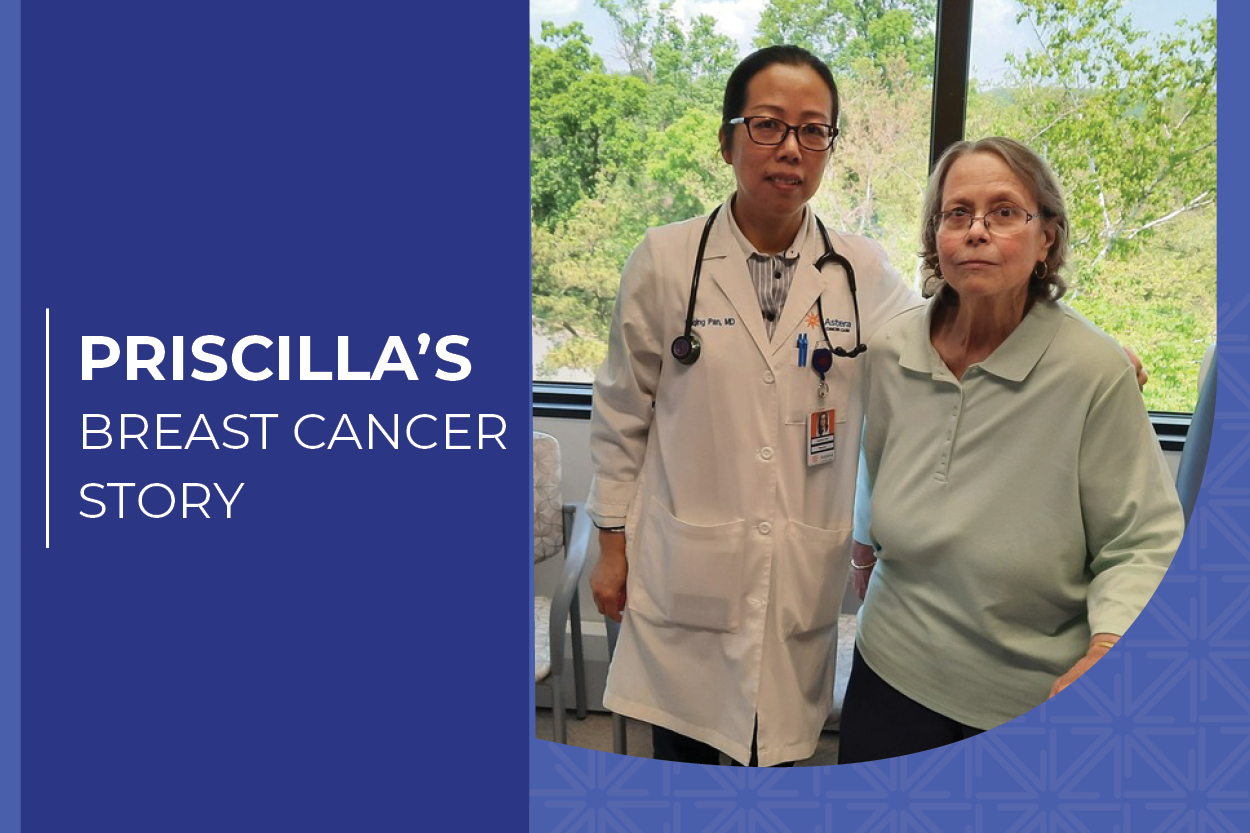In 2001, Priscilla was a 48-year-old recovery room nurse at Somerset Medical Center when she started experiencing some pain in her left shoulder. A coworker who was an orthopedic surgeon suggested she get some imaging done because he thought she might have torn her rotator cuff—a common injury among nurses.
Priscilla went for an X-ray and quickly found out that she didn’t have a torn rotator cuff. The results were worse than expected—she had a tumor in her left humerus, which is a bone in the upper arm. After extensive testing, her medical team determined the tumor had spread to her left humerus from her breast, diagnosing her with stage IV breast cancer.
Priscilla sought care at Astera Cancer Care under the expertise of Medical Oncologist-Hematologist Dr. Beiqing Pan. Dr. Pan offered comprehensive information about her treatment and delivered personalized care, guiding her through every phase of the treatment process.
While Stage IV breast cancer isn’t curable, it can be treated. The lifespan of someone diagnosed with this form of cancer varies, but research shows that somewhere between 25 and 30 percent of people with stage IV breast cancer survive for five years or more. Common treatments include some combination of hormone therapy, immunotherapy, chemotherapy, and other targeted drugs.
For Priscilla, treatment started with radiation of the humerus because the tumor affected nearly the whole bone. The outcome was extremely successful. “Six months later, you couldn’t even tell I had cancer in the bone,” she told us.
“Priscilla is a miracle patient,“ Dr Pan says. “To live more than 20 years with stage IV breast cancer is astounding.”
Priscilla’s cancer journey has been challenging, involving an intensive medication regimen. She received oral endocrine therapy, medications to strengthen her bones, and additional radiation in her lumbar spine. Despite the cost, Astera has played a crucial role in helping her secure financial support for these expensive medications.
Recently, Priscilla went for a liquid biopsy, which will help doctors try to identify mutations in her cancer by examining circulating tumor DNA. The results of the biopsy will guide her future treatment, letting her care team know if she’s a good candidate for any targeted therapies. A targeted therapy is a highly precise treatment designed to attack specific kinds of cancer cells.
Throughout her journey with cancer and despite the complexity of her case, Priscilla has always felt as though her treatment and care couldn’t have been better. She has always felt extremely supported by Dr. Pan and the rest of her medical team at Astera Cancer Care. “If you have any questions, they are always there to answer anything, and it was almost like they became family,” she says.
In many ways, Priscilla’s life has changed significantly since becoming sick. She used to love visiting the beach, swimming, staying active, and spending time in nature. Now, at 70, she uses a walker following multiple back surgeries that are unrelated to her breast cancer diagnosis and treatment.
“Even though she is walking with a walker now, she is taking care of herself and always trying to be independent,” Dr. Pan says. “I admire her spirit of fighting for life, courage, and resilience.”
Even though her body sometimes reminds her otherwise, Priscilla still feels young in her mind. She spends a lot of time reading, crocheting, and taking walks outside. “ I enjoy the outdoors greatly,” she says. “The sunshine—I always feel better when the sun is out.”
Priscilla also works with breast cancer patients in her job as a nurse. Offering support and sharing her experiences with people going through something similar gives her a feeling of purpose and meaning in life.
She feels lucky to have a great network of friends and family who are always around to lift her up and lend a helping hand. Her niece calls her three times a week, and her friends drive her to medical appointments, offering endless support.
“We’ll always take care of you,” they tell her.

